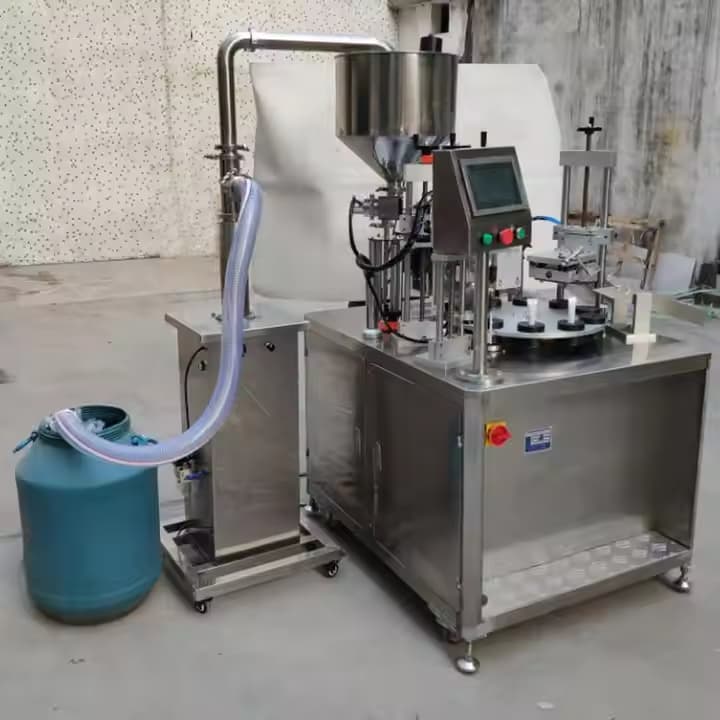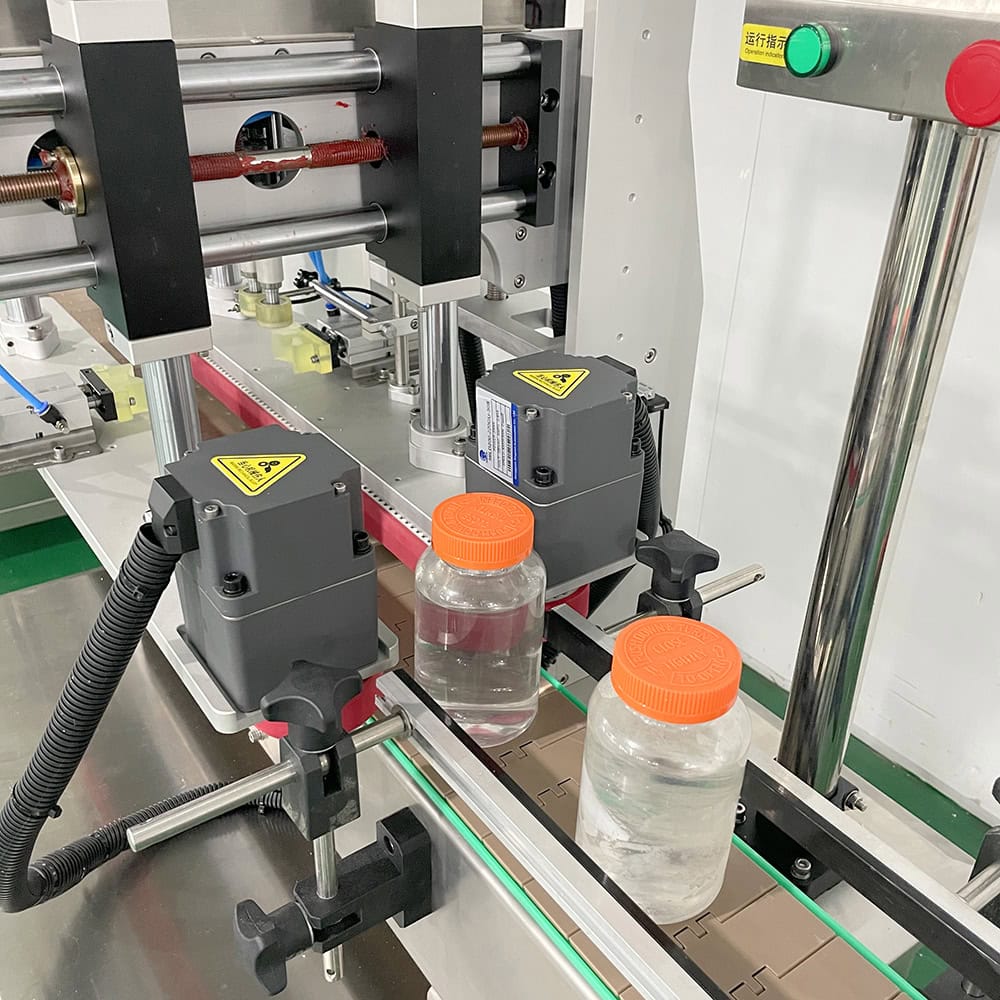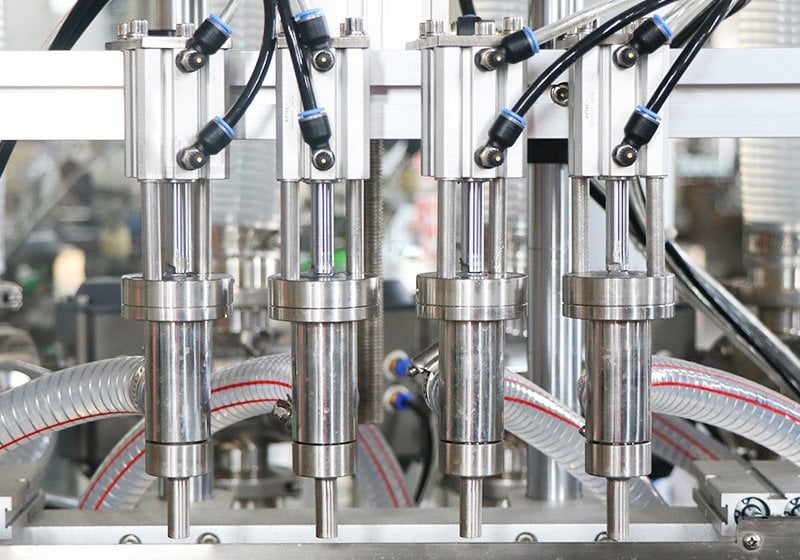Not knowing how to pick the right liquid filling machine will make you inefficient and cost you money in production.
When you’re trying to pick out a liquid filling machine, you need to know things like the viscosity of your product, how fast you want to fill your product, the type of container you’re going to put your product in, and any regulations in your industry. You also need to know how much you want to grow.
Here is a guide to help you pick out the best liquid filling machine for your needs.

Understand the Types of Liquid Filling Machines
There are several types of liquid filling machines available, each suited for different products and production setups. The most common types are volumetric fillers, piston fillers, and gravimetric fillers.
Volumetric fillers are ideal for free-flowing liquids, dispensing precise amounts based on volume. These machines are perfect for the food and beverage industries, where consistency is crucial. Piston fillers, in contrast, are better for thick or viscous products such as creams, pastes, and sauces. These machines use a piston mechanism to deliver exact quantities of product with high accuracy. Gravimetric fillers, which work based on weight, are ideal for products requiring precise control, such as chemicals or pharmaceuticals.
By understanding the strengths and applications of each type of filler, you can better match a machine to your specific production needs.
Consider Your Product’s Viscosity
Product viscosity is a significant factor in choosing a liquid filling machine. Low-viscosity liquids, like water or juice, flow freely and can be easily handled by a gravity filler or volumetric filler. For high-viscosity products, such as shampoos or honey, you’ll need a piston filler designed to handle thicker substances without clogging or overfilling.
Choosing a machine that matches your product’s viscosity ensures accurate fills and prevents operational issues like spillage or machine malfunctions.

Production Speed and Volume
The scale of your production line also plays a crucial role in selecting the right machine. Automatic liquid filling machines are built to handle high-speed, high-volume operations, with some models filling thousands of bottles per hour. On the other hand, semi-automatic machines are better suited for lower production volumes or businesses that are in the growth phase.
Understanding your current production needs, while also considering future growth, can help you choose a machine that’s both cost-effective and scalable. If you’re running a large-scale operation with high throughput, investing in a fully automated filling machine will ensure efficiency and long-term savings.
Container Type and Size
Your container’s shape, size, and material can also influence your choice of liquid filling machine. Whether you’re filling bottles, jars, or cans, the machine must be compatible with your container type. For instance, a bottle filling machine works well with bottles of varying sizes, while machines for cans or vials might require different setups or adjustments.
Machines like Flag Labeling Machines or Corner Wrap Labeling Machines are ideal for industries that require precise labeling post-filling. Ensuring the right fit between your filling machine and your containers will reduce operational downtime and prevent errors such as under-filling or leakage.
Industry Regulations and Compliance
If you operate in regulated industries such as food, pharmaceuticals, or cosmetics, compliance with industry standards is paramount. For example, in the pharmaceutical industry, liquid filling machines must meet FDA standards for cleanliness and precision.
Many machines offer advanced features such as clean-in-place (CIP) systems, which ensure that the filling machine remains sterile during production. These features are essential for ensuring product quality and maintaining compliance with health and safety regulations.

Automation Level and Ease of Use
Determining the right level of automation is key to maximizing production efficiency. Fully automatic liquid filling machines are ideal for high-volume production lines, while semi-automatic or manual machines are more suitable for smaller batches or growing businesses.
In addition, user-friendly features such as touchscreen interfaces and programmable settings make modern filling machines easier to operate, reducing the need for extensive training and minimizing downtime.
Maintenance and Support
Maintenance should be a significant consideration when selecting a filling machine. Look for machines with easily accessible parts, long-term warranties, and technical support. Regular maintenance ensures a longer machine lifespan and prevents costly breakdowns.
Manufacturers that provide comprehensive service agreements and have readily available spare parts can save you time and money, ensuring smooth and uninterrupted production.
Budget and ROI
While budget constraints are important, you should also focus on long-term value. High-speed, fully automated machines may have a higher upfront cost but offer better return on investment (ROI) due to higher production speeds and efficiency. Conversely, if your production volume is small, a semi-automatic filling machine may be a better fit, offering flexibility and lower initial costs.
Make sure to weigh the initial investment against the operational savings you’ll gain from increased production speed and reduced labor costs.

Integration with Existing Systems
If you already have other machines in place, such as a Label Printer or Capping Machine, make sure that the new filling machine integrates seamlessly with these systems. Smooth integration ensures that your production line runs efficiently without bottlenecks or misalignments.
Look for machines with modular designs or compatibility with existing equipment to avoid the need for expensive retrofits.
Future Scalability
It’s important to choose a filling machine that will accommodate your business as it grows. Some manufacturers offer modular designs that allow you to add more features or increase the machine’s capacity over time. This flexibility can be a crucial advantage as you scale your production.
Investing in a machine that can grow with your business can save you the hassle and expense of replacing your equipment as your production volume increases.
Conclusion
Choosing the right liquid filling machine depends on a thorough understanding of your product’s characteristics, production needs, and future goals. By considering factors like product viscosity, container type, and compliance with industry regulations, you can select a machine that ensures operational efficiency and future scalability.
You may be interested in:









